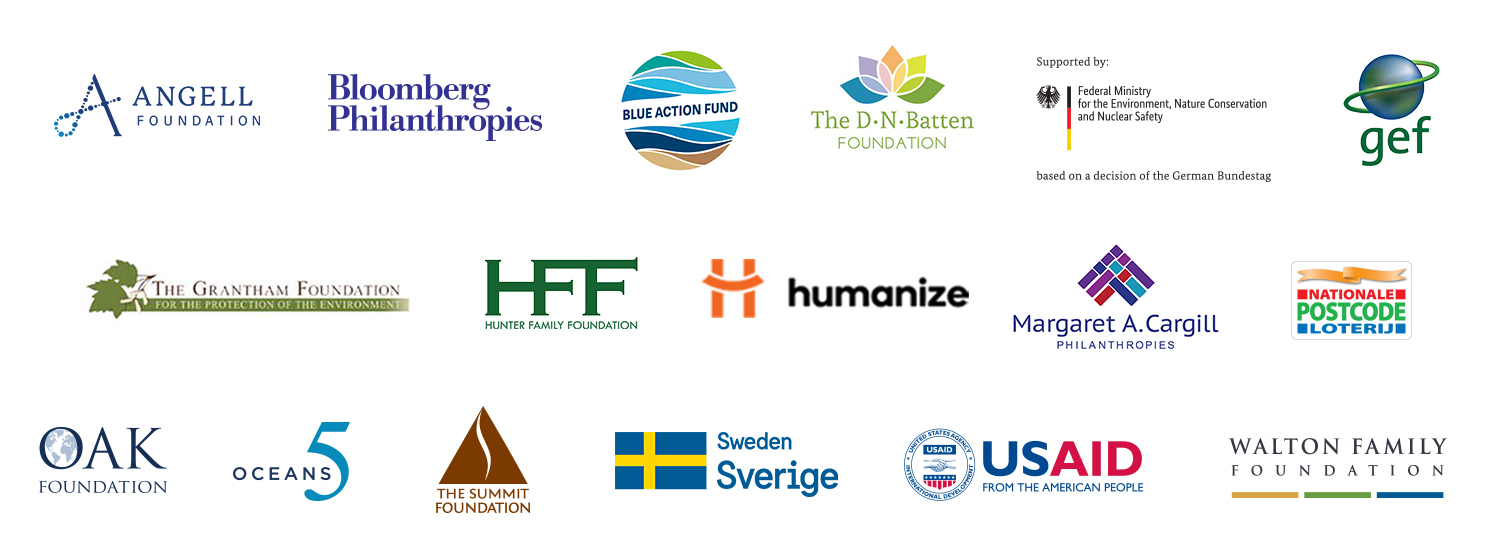Make sure you never miss an update. subscribe to the progress update newsletter
In this issue, find news and updates on:
MARINE RESERVE DESIGN: Turning Competition into Coordination
A provincial governor Leads Efforts for Sustainable Fisheries in Indonesia
Delivering a New Vision for Fisheries in the 21st Century
A Milestone for Enabling Managed Access with Reserves in Mesoamerica
In Other News
The Science of Fish Forever – What We’re Reading
Marine Reserve Design: Turning Competition into Coordination
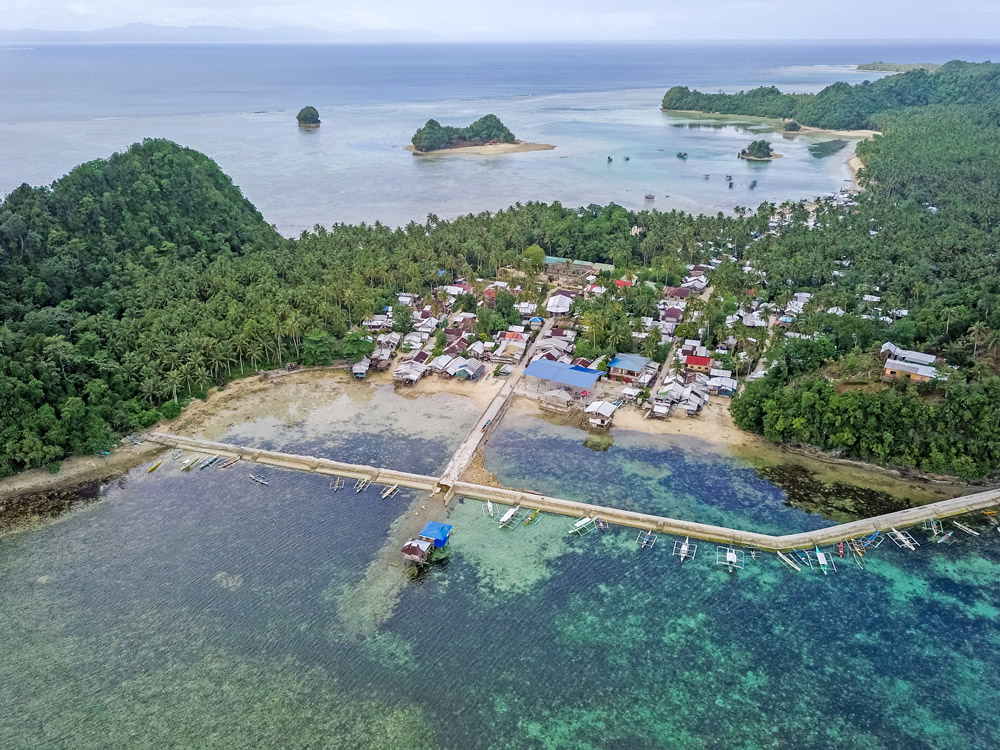
Approximately one year ago, we introduced Fish Forever’s scientific approach to optimizing marine reserves, which balances dual benefits for conservation and sustainable fisheries. This process—designing networks of no-take reserves coupled with managed access fishing areas that span adjacent communities—links ecological connectivity with the scale of how fisheries are used. And it models how fish and their habitats are naturally connected to identify critical areas to protect. Equally, it ensures that protected areas provide spillover into the fishing grounds to sustain the fishery. As we’ve written before, this connectivity collectively provides benefits for species and habitat recovery and fisheries yield.
The success and benefits of effective marine reserve design for coastal waters depends on convincing its primary stakeholders—the small-scale fishing communities and government authorities—of the importance of two things: protecting the ecologically-important reserve areas to ensure a fishery’s future and recognizing the implications of each area’s contribution to the more extensive reserve network. That is, scientific guidance is the starting point. It’s just as critical that those closest to the resources have bought into the science behind creating these networks, are using the outputs to decide where the reserves will be, and understand that they are both ecologically and socially connected to other fishing communities—that what they, or their neighboring fishers, do, affects the shared future of the region’s marine resources.
Fish Forever’s networked reserve design approach is both a scientific and behavioral solution to a cooperative dilemma—the classic ‘tragedy of the commons’ scenario in the marine realm where what is best for the individual in the short term is bad for the group (and the individual) in the long term. Creating effective marine reserve networks must turn a problem of individual competition, and the temptation to fish in the reserve, to one related to enhanced social coordination—where the collective benefits from the reserves to the community are seen to outweigh a solo gain… Read more
Indonesia’s SES Governor Leads Efforts for Sustainable Fisheries in Indonesia
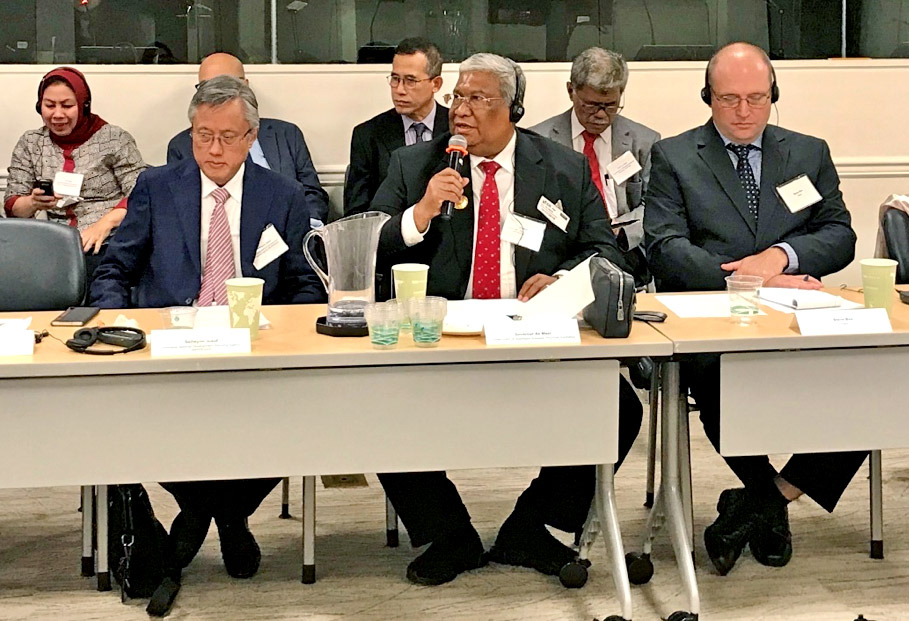
The Governor of Southeast Sulawesi joined Rare in Washington, DC on October 16 and 17 for two events on the sidelines of the World Bank’s semi-annual meeting: a private luncheon to discuss partnerships and opportunities with Rare, and a broader roundtable on sustainable investment for oceans hosted at the Inter-American Development Bank. The Governor is leading efforts to engage coastal fishers in Indonesia’s Southeast Sulawesi province and recently signed into effect a groundbreaking provincial regulation promoting Managed Access with Reserves (MA+R) as a model for other provinces. His participation in the meetings brought a valuable governance perspective on actual implementation to the global discussions. During the luncheon, he voiced ongoing support for the partnership with Rare and Fish Forever efforts, and at the roundtable, called for investors, governments, aid organizations, and NGOs to invest more in helping coastal communities.
Delivering a New Vision for Fisheries in the 21st century
Some people say fisheries management is about managing the people, but here we argue it’s managing with the people, and by the people.”
Ratana Chuenpagdee, Panel 4 Chair, Securing sustainable fisheries livelihoods
With a simple but powerful statement, Dr. Chuenpagdee, a Researcher from Canada’s Memorial University, Panel Chair, and Project Director of the Too Big To Ignore: Global Partnership for Small-scale Fisheries Research, captured a core tenet of the discussions and debates related to small-scale fisheries at the first-ever International Symposium on Fisheries Sustainability: Strengthening the Science-Policy Nexus. The Food and Agriculture Organization of the United Nations (FAO) organized the event, held November 18-21, 2019, in the lead up to next year’s Committee on Fisheries (COFI) meeting.
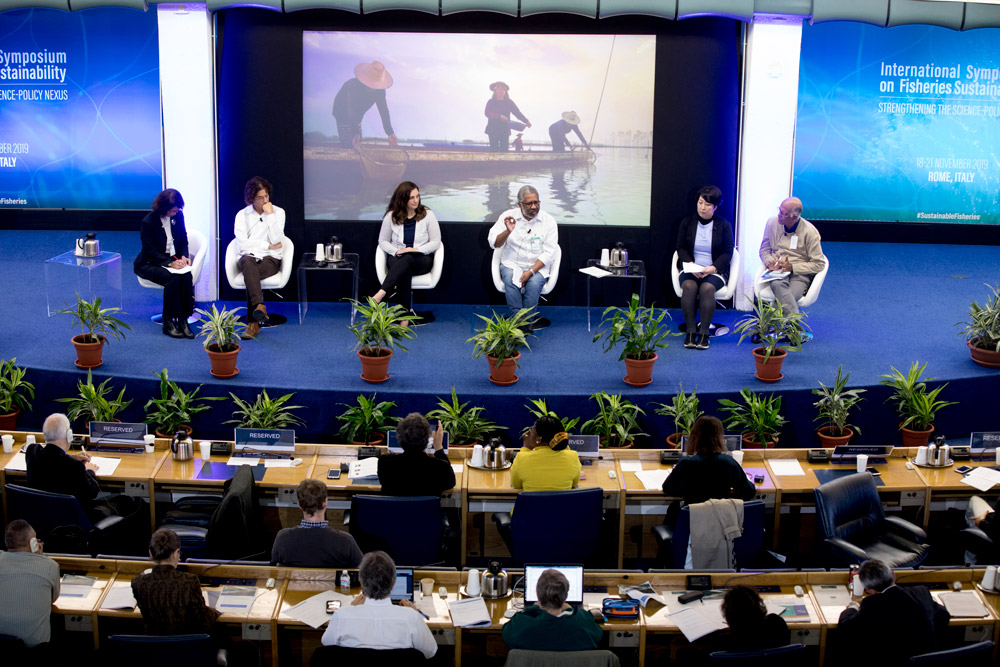
The Symposium’s objective was “to bring together the best expertise and knowledge and to use this opportunity to address key technical questions, identify potential solutions and help us deliver a new vision for fisheries in the twenty-first century.” As a panelist, event co-sponsor, and technology presenter during the Fisheries Innovation Forum, Rare’s participation centered on elevating small-scale fisheries’ role in delivering this new vision. Among the approximately 1,000 participants in attendance, Rare’s seven-person delegation consisted of Rare staff, a District Administrator and Fish Forever partner from Mozambique, and delegate from Fish Forever’s implementing partner, Centre for Marine Studies, in Honduras.
Five Major Themes Related to SSF that Emerged from the Symposium
While the Symposium tackled challenges and opportunities related to marine and inland fisheries globally, a focus on small-scale fisheries was evident throughout most sessions, particularly during Session 4, Securing sustainable livelihoods. Listening for how small-scale fisheries were represented in the discussions, we put together a sample of critical messages that resonated with us… Read more
A Milestone for Enabling Managed Access with Reserves in Mesoamerica
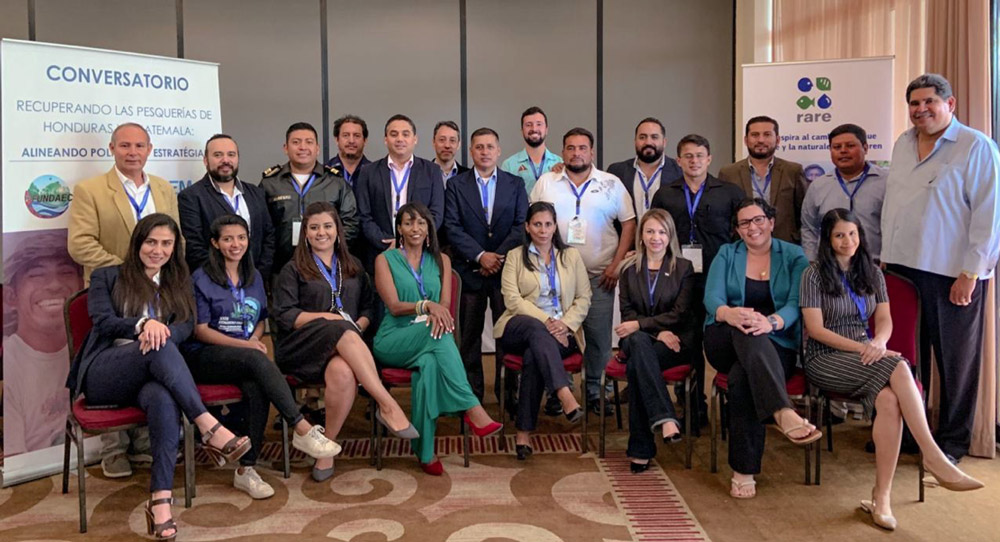
A significant obstacle to implementing a managed access with reserves approach in Honduras and Guatemala is an apparent lack of legal frameworks to enable this management solution.
In October, Rare and partners the Center for Marine Studies and Fundaeco in the Mesoamerican Reef region convened the OSPESCA Director, Reinaldo Morales, and Honduran and Guatemalan legislators, fisheries directors, protected area officers, municipal representatives, Armed Force officials, and fisheries leaders to address this challenge. And as a result, the 15 stakeholders from Honduras and Guatemala identified potential legal pathways to enable both the designation of rights necessary to establish managed access and pathways for delineating fully-protected reserves in each country. In addition, the group identified opportunities to align management actions across national borders and crafted action plans to capitalize on the pathways and opportunities identified. Participants capped off the workshop by committing to prioritize actions that ensure sustainable management of their shared marine resources.
In Other News
Our Ocean 2019: Recap
If you couldn’t attend Our Ocean this year or want a recap, we captured the main takeaways related to the small-scale fisheries sector.
Inspiring Change in Public Health
As part of a new partnership, Rare Philippines conducted its first training with the Zuellig Family Foundation in September to introduce behavior adoption strategies that can be applied to public health programs. In return, the foundation will train selected Rare staff and Fish Forever’s mayoral champions in its Bridging Leadership program. The foundation, part of Zuellig Pharma—Asia’s leading health care services provider—focuses on improved health outcomes and better access to health services through governance training for community leaders.
New local ordinances favor coastal fishing communities in the Philippines
Check out a blog by Rare Philippines’ Yasmin Arquiza about providing professional fishers access to municipal coastal waters in various Philippines municipalities.
The Wild Coast: Webinar and Photo Essay on Participatory Photography in Mozambique
Watch the webinar and check out the photo essay about engaging communities through participatory photography, a research tool of Rare’s Center for Behavior & the Environment.
Partnering with the Royal Tropical Institute to mainstream gender equity into Indonesian fisheries
Earlier this year, Rare and The Royal Tropical Institute (KIT) kicked off a new partnership in Indonesia to mainstream gender equity into Fish Forever. With support from the Dutch Postcode Lottery, Rare and KIT are empowering Indonesian women to be full participants in managing their natural coastal resources, fish enterprises, and household finances. Piloting this new approach across project sites in Indonesia, Rare will use this learning in all ten of its partner countries.
Climate Change and Fisheries Media Forum in Manila
Rare organized a media forum in November to improve news coverage of climate issues affecting fisheries. Speakers included broadcast journalist Atom Araullo, Rare Philippines VP Rocky Sanchez Tirona, Climate Change Commissioner Noel Gaerlan, UP Resilience Institute Executive Director Mahar Lagmay, and IPCC Ocean report lead author Lourdes Tibig.
Fish Forever in the News
Featured article by Inside Philanthropy about Bloomberg Philanthropies Vibrant Ocean Initiative
Read article
World Bank blog about coastal fisheries in Mozambique
Read blog
An interview with Raymond Jakub, Indonesia’s Sr. Manager for Data and Fisheries and Pew Marine Fellow
Read interview
The Science of Fish Forever
Contextualizing the social-ecological outcomes of coral reef fisheries management (Nov 2019)
Johnson, S.M., Reyuw, B.M., Yalon, A., McLean, M., and Houk, P. (2019). Contextualizing the social-ecological outcomes of coral reef fisheries management. Biological Conservation, p.108288.
This study investigated the relationship between the social-system structure and trends in fish assemblages of coastal communities in Yap, Micronesia. The authors found that communities with decentralized decision-making and a communal form of fishing had higher fisheries yield. This result underscores the role of community-oriented management in successful conservation.
Information access and knowledge exchange in co-managed coral reef fisheries (Nov 2019)
Barnes, M.L., Mbaru, E., and Muthiga, N. (2019). Information access and knowledge exchange in co-managed coral reef fisheries. Biological Conservation, 238, p.108198.
This study examined whether co-management institutions in four Kenyan coastal communities could break down traditional social, cultural, and economic barriers to access information and exchange knowledge. The authors found that wealth was a significant factor in accessing fisheries management information, but local leaders and NGOs were the primary sources of fisheries-related knowledge, acting as brokers. These results suggest that social, cultural, and economic factors structure knowledge exchange.
Implementing a social-ecological systems framework for conservation monitoring: lessons from a multi-country coral reef program (Dec 2019)
Gurney, G.G., Darling, E.S., Jupiter, S.D., Mangubhai, S., McClanahan, T.R., Lestari, P., Pardede, S., Campbell, S.J., Fox, M., Naisilisili, W. and Muthiga, N.A., (2019). Implementing a social-ecological systems framework for conservation monitoring: lessons from a multi-country coral reef program. Biological Conservation, 240, p.108298.
This study describes the first operationalization and implementation of Ostrom’s social-ecological system framework for monitoring and managing reef fisheries. The authors explain how key insights from this framework inform decision making at multiple levels in 85 communities in four Indo-Pacific countries. The analysis outlines key steps of the framework and explains lessons learned that can be used in monitoring and managing coral reef fisheries in other countries.
Mangroves reduce the vulnerability of coral reef fisheries to habitat degradation (Nov 2019)
Rogers, A., and Mumby, P.J., 2019. Mangroves reduce the vulnerability of coral reef fisheries to habitat degradation. PLoS biology, 17(11), pp. e3000510-e3000510.
This study explores whether the presence of mangrove nursery habitats can promote fish productivity on degraded reefs. Using size-based ecosystem models of coral reefs with high and low structural complexity, the authors found that low-complex and degraded reefs with mangrove nurseries can support fisheries’ productivity equivalent to or greater than complex reefs that lack a nursery. These results highlight the importance of including and protecting mangroves within managed access and marine reserve systems.
Small-Scale Fisheries: Too Important to Fail
Chuenpagdee, R., and Jentoft, S. (2019). Small-Scale Fisheries: Too Important to Fail. In the Future of Ocean Governance and Capacity Development (pp. 349-353). Brill Nijhoff.
This essay is a concise overview of the importance of small-scale fisheries to global and local food security, employment, and viable livelihoods. The authors highlight that small-scale fisheries are complex ecological and socio-economic systems that contribute at least one-quarter of the world catch and employ over 100 million people. The essay describes how community cohesion, social safety net, and resource stewardship are important components of small-scale fisheries, but they are often ignored and marginalized in policy-making. As such, globally, small-scale fisheries are struggling with a lack of power, representation, and organization and substantially contribute to overfishing. The authors explain how small-scale fisheries are not only too big to ignore but also too important to fail.
Blue Paper #2: The Expected Impacts of Climate Change on the Ocean Economy (Dec 2019)
This blue paper, authored by The High-Level Panel for a Sustainable Ocean Economy and released during this year’s UNFCCC COP25, provides a first-of-its-kind analysis into the country-by-country impacts of climate change on three of the largest sources of ocean-based revenue and jobs: coral reef tourism, wild capture fisheries, and marine aquaculture.
The paper finds that climate change will have wide-ranging and severe impacts on the ocean and ocean-based economy, particularly in developing countries along the equator. It concludes that a forward-looking, cooperative, and equitable response to climate change impacts is required, in tandem with fast-tracking adaptive fisheries management, to avert potential resource conflicts and secure ocean-based industries in the coming decades. Yet it highlights that any response will only be effective if we substantially cut greenhouse gas emissions and restore ocean health so that it can continue to provide valued functions as the climate changes. The Panel has commissioned leading scientific experts to explore this and other pressing challenges at the nexus of the ocean and the economy through a series of 16 blue papers. The papers will inform the Panel’s final recommendations for a Sustainable Ocean Economy in 2020.
Fish Forever: A solution to coastal overfishing – delivered by empowering communities through clear rights, strong governance, local leadership, and participatory management – that protects essential fish habitat and regulates fishing activities to replenish and sustain coastal fisheries.
Goal: To deliver replicable and scalable community rights-based management across ten countries, using a global network of 500 local leaders to secure livelihoods for one million fishers, alleviate poverty, ensure food supply, and protect coastal ecosystems from chronic threats.
Fish Forever Countries: Philippines, Indonesia, Mozambique, Brazil, the Caribbean Coasts of Honduras and Guatemala, and the Pacific Island countries of Palau, Federated States of Micronesia, and Marshall Islands
Fish Forever is possible thanks to the support of many, including the following current donors:
